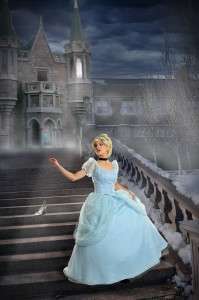
Think of your favorite movie, or your favorite novel. Is it one without struggle, defeat, a mid-course crisis? Not likely. The greatest movies of all time, the blockbusters, fill the screen with nail-biting tension, heart-ripping agony, the devastation of war, a lover’s betrayal, impossible odds, and utter despair. What pulls us into the movie is not the pain, but the overcoming of adversity, the denouement of redemption, the villain conquered, good defeating evil. We crave movies with heroes, but without conflict they don’t show up.
On a recent visit with my little granddaughters, we watched the new Cinderella movie three days in a row—yes, we did. What is it about this classic that magnetizes us? It’s not the light-hearted storyline or the surprise ending. It’s the combination of the protagonist, Cinderella, and the setting in which she is trapped. We sigh at the news of her father’s death. We feel her heart drop when forbidden to go to the ball. We hold our breath when the prince glances up and sees her at the top of the stairs.
What if Cinderella’s parents had not died? What if she’d grown up happy-go-lucky and in due time married the prince? Boring and unrelatable. There may be stories like that, but we don’t remember them. We’re drawn to movies that mirror the challenges of real life, but turn out in favor of the underdog.
The make-believe aspect of Cinderella doesn’t lessen the impact. We all secretly hope for a supernatural force in our story. We too have hurts, and long to be rescued and taken to a safe place where we live happily ever after.
Why did the author of Cinderella put so much hurt in her story? And why does God allow hurt in ours? In life and in literature we find a similar paradox: struggle enhances the effect—the greater the pain, the greater the gain. For Cinderella, her crushing grief, cruel treatment, and waning hope, magnifies her beauty and her kindness. The happily-ever-after is sweeter because of what she endured.
We find these same elements in the gospel—God’s story of redemption. The beauty of the cross hides until we find ourselves hopeless. The rescuer is not summoned until we find ourselves lost. The hurt obscures its value until the journey leads us home.
The ideal movie is not the one without conflict. The ideal book is not the one without tragedy. The ideal life is not the one without hurts.


Wow. Powerful message and perspective! For believers, heaven will be better than any Cinderella story, Rudy, The Patriot, Iron Will, or Apollo 13 ending. For we endure any hardship, pain, and disappointments on this earth, looking forward to our eternal destiny. I am thankful that Jesus sent us a helper – the Holy Sprit to give us power and strength while on this earth. Live for Christ daily. Live dependent on the Holy Spirit moment by moment. Live with an eternal perspective. Thank you Janet, for helping us put life into perspective.
Another thought I had: Cinderella’s motto passed down from her mother “Have courage and be kind” had much more impact because she lived it out even in the midst of her struggles. We have a Christian message that we share, and its impact will also depend on us living it out in the midst of our troubles.
Yes’em….must be the way He intended it all along?
Some days we don’t like God’s ways, but we trust that He knows what he’s doing.
As has been posted many times on FaceBook as with other places, the list of the problems that the “heros of the bible had.” Although sometimes surprising that the best stories have all the elements of good vs evil, but the best, by far, is obviously the bible itself. What I have discovered the most is that it is obviously God’s plan for us to have some… perhaps many “BAD” days and times to struggle through. So we can see him more clearly once (through him) we have come through victoriously. Sometimes this happens both in this life, or in the next. Either way, we will be the victors through him. Hooray for The Hero, Christ Jesus!!
Thank you Tony. You are right on.
How ironic that you would write about this today. I have just finished an hour long drive and on the way I was contemplating how I might approach someone I know who is terminally ill about the love of Jesus and why he came to Earth to save us. I was thinking about the whole hero/villain thing all the way home. I was going over and over in my mind how every book and movie with a good vs evil plot is rooted in the message of the cross whether the authors know it or not. I was thinking I might put the gospel to my friend that way – that Jesus is our hero and he came to rescue us from sin and the evil one in order to take us to himself for all eternity. And then I read your blog!!! Right on target for me, Janet! And Ethan – “better than Rudy” is really saying something for you! 🙂
We will pray for your friend. This is a time of great vulnerability and many who know the end is near are more open to the greatest news that heaven is a free gift. We don’t have to work our way there, in fact we can’t work our way there. But the beauty of the gospel is that Jesus did all the work necessary on the cross. If your friend is a woman she might really enjoy the new Cinderella movie. I can’t wait to see it again.
Janet, Love your comparison of Cinderella’s experience and that of a Christian’s. That brings to mind James 1:2-4 : Count it all joy, my brothers, when you meet trials of various kinds, for you know that the testing of your faith produces steadfastness. And let steadfastness have its full effect, that you may be perfect and complete, lacking in nothing.” John MacArthur lists eight benefits of trials. They test the strength of our faith, humble us, wean us from worldly things, call us to eternal hope, reveal what we really love, teach us to value the blessings of God, enable us to help others in suffering, and develop enduring strength for greater usefulness. May the trials God sees fit to bring into our lives purify us from the love of the world and drive us to seek comfort, strength, and direction from His Word. May we focus on pleasing and serving Him until Christ the Bridegroom returns for the church His Bride. I hope to be able to watch Cinderella with my granddaughter!
Wow Shan, love everything you said. Excellent. There are so many benefits to trials if we are open to it. Thanks for sharing.
Janet, what you are describing is a literary device called “The Heroes Journey.” It was first identified by the Swiss Psychiatrist Carl Jung. This device, also called a “redemptive analogy” is so effective because it is built deeply into the human psyche by God and points us to our need for a Redeemer. It follows the pattern of salvation God unfolds in Scripture. There is an unlikely hero who is given the task of defeating some terrible evil against seemingly insurmountable odds. He must endure tremendous adversity. Near defeat, he receives help to overcome, and is transformed in the process. Many of the greatest stories of all time follow this pattern. Their popularity lies in their appeal to a God-given need within the human heart. By the way, I am Shan’s husband and I am very proud of her!!
Hi Craig, That is extremely helpful to me because I often refer to this concept but didn’t know it was an official theory. I will save your comments to better explain this in the future. thank you so much. I’m jumping up and down with gratitude.
One more thing Craig, I’m proud of Shan too.